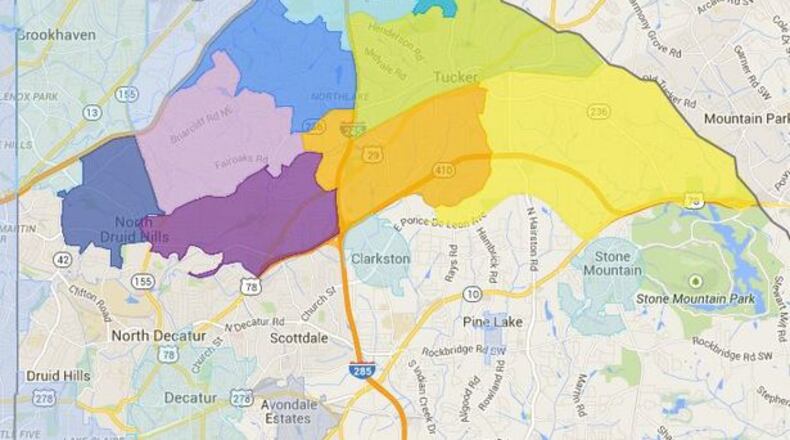Voters approved creating the city of Tucker on Tuesday, but unofficial returns showed that they rejected forming the new community of LaVista Hills.
Tucker, which has been an unincorporated but well recognized region for more than 120 years, will cover about 20 square miles from Interstate 285 to Stone Mountain. Voters passed the measure creating the city by a wide margin.
Meanwhile, with all precincts reporting, LaVista Hills appeared to suffer a narrow defeat.
Supporters of the two potential cities sought their incorporation as a way to achieve more local control of their government and to distance themselves from DeKalb County’s troubles.
With more than 33,000 residents, Tucker becomes the eighth new city formed in Metro Atlanta over the last decade, a trend that started with Sandy Springs’ incorporation in 2005.
Another 67,000 people who live in LaVista Hills, with boundaries mostly inside the Perimeter, will remain part of unincorporated DeKalb.
With the addition of Tucker, there will be 71 cities in the Atlanta area’s 10 core counties.
Backers of the cityhood movements were motivated in part by allegations of crookedness and waste in DeKalb. Several elected officials, including suspended DeKalb CEO Burrell Ellis and former Commissioner Elaine Boyer, are serving prison time following their convictions on corruption charges.
Both cities would have taken over services from the county, including parks, planning, zoning, code enforcement. LaVista Hills would have also started its own police force, while Tucker will continue relying on DeKalb police.
The question of whether the areas should incorporate was hotly debated for months after the Georgia Legislature authorized Tuesday’s referendums.
Yard signs dotted neighborhood lawns, with supporters rallying behind the slogan “Too late to wait” and opponents behind “Time out. Let’s think.” Residents dealt with a barrage of robocalls and emails.
Residents who fought the incorporation efforts argued starting new cities could be a costly mistake and that small governments that won’t necessarily do a better job than the county. Some feared that they’ll end up paying for expensive government bureaucracies, leading to higher property taxes.
But proponents of the cities said they don’t anticipate tax increases, and they believe city governments will be run more efficiently than Georgia’s fourth-largest county.
City residents will still depend on DeKalb for most of their local government, including education, water, sewer, court, sheriff, library and many other services.
The passage of the cityhood referendums would mean about 230,000 people live in DeKalb’s cities, and nearly 500,000 people would remain in unincorporated areas run more extensively by the county government.
A key point for city backers was that they’d gain closer representation of their communities compared to DeKalb, which has seven commissioners overseeing a county of 722,000 residents.
About the Author
Keep Reading
The Latest
Featured




